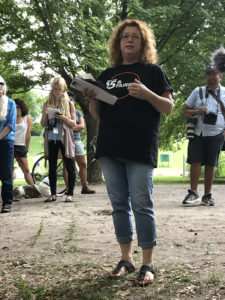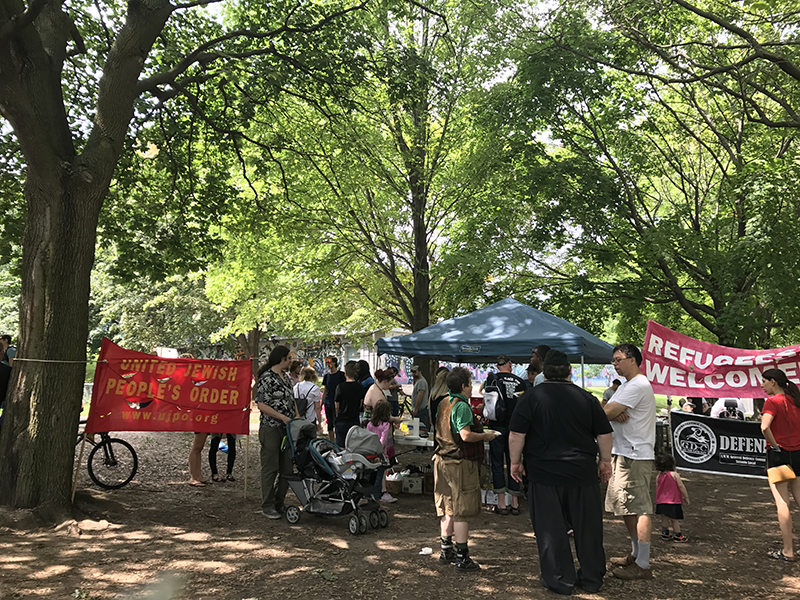On Aug. 16, 1933, Christie Pits, a large park in midtown Toronto, was the site of a baseball game that erupted into a huge melee, after anti-Semitic spectators displayed a giant swastika.
One team, which was predominantly Jewish, saw the Nazi symbol and reacted by destroying the swastika and engaging in a physical altercation with the anti-Semitic group, known as the Pit Gang.
The number of fighters on both sides escalated with young Italian men joining in to support the Jews. The fracas – it became known as the Christie Pits Riot – spread into nearby streets and continued for another six hours.
A rally and a community barbecue to mark the 84th anniversary of the riot and the historic stand against fascism was held at Christie Pits on Aug. 20. It drew many participants from various groups, who turned up to show their solidarity against modern-day proponents of white supremacy.
The Christie Pits gathering happened to coincide with rallies in Boston and Vancouver over the weekend that were organized by white supremacists who were completely outnumbered by large counter-protests.
READ: TO APOLOGIZE FOR NEO-NAZIS IS TO BE ON WRONG SIDE OF HISTORY
Those demonstrations were held in the wake of the violent clashes between the far-right and counter-protesters in Charlottesville, Va., on Aug. 12.
At Christie Pits, a large banner that read, “Refugees Welcome,” was used to repudiate the anti-immigration protests that took place in Quebec City the day before.
An organizer of the Christie Pits commemorative barbecue, who used the pseudonym Jacob Zelig for political reasons, attributed the high turnout to the violence in Charlottesville.
Several groups had organized the barbecue, including United Jewish People’s Order (UJPO), Independent Jewish Voices and the General Defence Committee – Industrial Workers of the World. Also present were members of the interfaith sisterhood of Salaam Shalom, including Rabbi Emma Gottlieb, director of education at Makom, a non-profit serving the Jewish community in downtown Toronto.
“It felt really important to be here to reflect on our history in Toronto,” said Rabbi Gottlieb, “to make sure that history is not repeated … especially in light of the events that took place (in Charlottesville).”

Some people at the barbecue had family ties to the Christie Pits Riot.
Susan Oppenheim said her mother, Rose Dolgy, who had trained with legendary Toronto boxer Sammy Luftspring, took part in the fight.
Rebecca Gowler’s grandfather, Isaac Miller, also fought there. “My zaide and some of the neighbourhood guys came to the park with baseball bats,” said Gowler.
“There’s a link between what took place here in 1933 and what’s happening today,” said Julia Barnett, president of UJPO. In her address to the group, she stressed the importance of fighting fascism, racism and Islamophobia, saying that, “UJPO is unequivocally opposed to all forms of racism.”
Her words were echoed by all the speakers, including Zelig, Carolyn Egan, president of the United Steelworkers of Toronto, and Qaiser Ali, a Muslim transgender person.
Egan praised the young Italian men who came out to support the Jewish ball players who had been targeted by the Nazi sympathizers at Christie Pits. “The Italian boys stood in solidarity and fought back,” said Egan.
And the battle against fascism and neo-Nazism must continue, she said. “Just look in Europe, where fascism has taken hold.”
According to Egan, the neo-Nazis in Charlottesville felt empowered because U.S. President Donald “Trump gives confidence to these people.”
Zelig told the group that Trump’s presidency has led to a rise in Islamophobia.
Ali spoke about bigotry many young Muslims growing up in Toronto have experienced, particularly after the Jihadist attacks of 9-11. Ali emphasized the importance of the “collective power” of the left.
“It means so much to me that I am not alone in this fight.”
